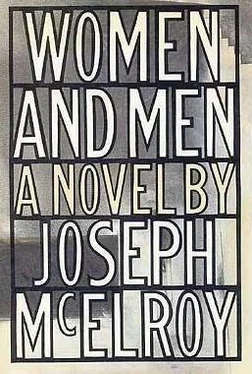Spence found the dark mark on the suede windbreaker. Am I a Trace?
No, the wounded man said. You’re not a Trace. That’s O.K.
Is Brad a Trace, then?
T.W. seemed to shrug an inch or two along the pavement, and a cop appeared. Brad? murmured T.W., Brad?
He’s been shot in the back, said Spence. The cop began talking into his box.
But what was the "flam"? said Spence. That’s what it was, said T.W., sl flam; why didn’t I think of that? Specialist. Got drawn in. . but into what? Yes, said Spence: what? Yes, brother, said T.W., what did I care about that family, what did I care about a Wide Load with its own built-in. .
Built-in what? asked Spence, torn, saddened, receiving bodily what he would as soon sling away far down to the sound of the engines down the avenue though it was a mysterious shape-like "nothing" in that sound.
National. . technical. .
Means? asked Spence.
. . music. What’s in the way makes it. Mean a warehouseful, wonderful, store a Nazi symphony for a generation, what energy. .
The cop was asking Spence who T.W. was. A black boy in a tweed overcoat knelt down to watch. He wore new thick white sneakers, and he straw-sipped from a can of soda in a brown paper bag.
Nazi? said the boy.
Means anti-Nazi, ‘xcuse, murmured T.W. He took my gun, said T.W. Who took your gun? said the cop, and looked at the boy and at Spence.
Pull the fur tail, said T. W., I want you to see the. . the light’s changing, said T.W. That’s right, said the boy. It threw me a curve, said T.W. Right, said the boy. T.W. grinned: I’m already on it; see me out there?
You’re right here, said Spence.
Let’s get outa here, said T.W.
Right, said the boy.
Portland.
Right.
Don’t leave just yet, said T.W.
Spence remembered his hand on T.W.’s shoulder. National technical. . music? said Spence, as blood appeared on T.W.’s upper lip slanting into the corner of his mouth.
Nose is bleeding, said the boy. They heard the clatter and static on the cop’s box. I’m dying, said T.W. I’m flush up against it.
A smell of scent came down and an elderly woman with chapped, rouged lips bent down: You’re not going to die, she said.
It’s only way I could see what was going on, said T.W. Such a waste. Made trouble for myself. Pull the fur tail.
The black boy reached for it and the cop told him Don’t touch it.
What waste? asked Spence.
We’re the same, said T.W. wearily.
Same what? said Spence looking back over his shoulder.
People, Santee, people. You’re out there someplace, aren’t you?
Yeah. That’s it. Are you the one who found the new reincarnation?
Up against it. Asked for it. Flush up against it. Drew me in so I can be just this one person, but drew me in so I buzzed right through it. Or around it, too: I can’t tell.
Who is the Chinese woman? said Spence.
She got the kid.
What’s his name? said the cop, and Spence looked up and said, T.W.; and T.W. murmured methodically, Thomas Winwooley. Of the Mayo Win-wooleys.
And where’s the mountain? said Spence; does Mayn know?
Can’t imagine being anyone else no more. Oh the load on top of the mountain might just be a lost anchor.
The mountain? said Spence, sorry for himself. He looked back across the intersection and saw a familiar broad-shouldered man with thick gray hair watching from across the intersection and rose and took a step or two and raised his hand. A cab came by, over there, scarcely stopping, and when it passed on, still seemingly empty (though the light turned its inside opaque), the man was gone. Maybe Mayn was still going to be at his apartment, but Spence did not check the date again, he had lost a day somewhere along the line.
What did he say? said Spence, turning back.
Mega death, said the cop, who had a mustache. Mega death. Do you know what that is? Do you know him? Do you know what he was talking about? Mega? What’s mega?
Spence reached and pulled the fur tail. T.W. seemed out of it. The cop told Spence, Don’t. . but the fur tail came all the way and attached to the end was a figurine of a woman. She had an owl face and she looked whittled, as if the wood had gone to stone. Spence gripped it. We’re buddies, he said to the cop. This thing belongs to both of us.
The boy looked up at the cop and back at Spence.
A cab pulled up in front of Mayn’s apartment building and Mayn came out with a young woman with thick, dark hair who had on a sailor’s peajacket and bluejeans. Mayn reached for the cab door and opened it, but the woman was talking to him; he answered her, throwing out his hand in some gesture; she grabbed his arm and went close to him, talking fiercely; she got into the cab and could not pull the door shut because he was holding the handle; he got into the cab and closed the door, and the cab pulled away from the curb and stopped at once. The door opened and Mayn’s arm could be seen and then his trousered leg, but his shoe never reached the street. He withdrew his leg and the door closed, and the cab accelerated to make the light, and as the cab passed him, Spence raised his arm and by coincidence or kindred force, the familiar man in the cab turned away from his evidently intense conversation and caught Spence’s eye, and Spence continued in the direction of Mayn’s building.
The knot of his mother Sue’s Knuckle (he knew it was her fine knuckle as if he could see it miles away) on the phone instrument at her end of the line spoke to the Eye so newly established in Larry’s shoulder-to-neck field. It had been established by reciprocal Weak Force slung out of another context yesterday though it seemed only half an hour ago, a context out there that he hated to think might be a coordinate system. And slung from distances so meaninglessly much greater (equal to these other distances, say from here to Long Island or to Donald Dooley’s girlfriend’s apartment find or Amy’s foundation, etcetera, or the place from which the Chilean guy who’s friend to Mayn possibly had phoned, equal distances all, like light in theory) that Larry half wearily yet sniffing some change knew would be tied in with the other discovered systems and forces, and he was determined to either make these discoveries go from him or make himself go from them. Meanwhile, she was telling him she loved him, his mother was, and he was seeing so clearly, against the sporadic down-the-hall, next-room voice of Donald as if D.D. thought Lar’ was still there, his mother and her friend (her mother? her daughter?) massaging each other and talking late into the night, and he was just bottomline bored with all that, and here she was seriously wondering what it would be like to come back to him and Marv. Marv, Lar’ knew, thought he didn’t want that any more, and Larry tried to find words to speak that would be between saying nothing and saying something and only succeeded in knowing that, parallel to her out-loud words, this messaging of her Knuckle to his Eye (though an earlike Eye) newly situated in his shoulder-to-neck field, proved again the Differential Telepathy whereby, even against Lar’s determined refusal of a future in it and other recent discoveries, voiceless communication over no matter what size area between unlike body-parts (as from shoulder blade to instep, or heart to hand, or ear to intestine or thigh, or, here, knuckle to eye) joined the two persons via the most extreme experience of each body part or organ in question so the memory became the power, i.e., of being winged or of so mutually taking one another’s life that a new one arose elsewhere or of caring to hear another’s circulation poured into your own without knowing if’t be ichor or terminal toxin. And while, on this phone with new friend D.D. now pausing in his speech in next room, Larry had his mother down his ear, up his brain, congruizing his personal body-envelope like that plode-plast invented in one of his bad dreams that’s tucked like a rubber into a wallet and when set off by hostile touch of mugger-thief as he takes your wallet blows up into plode-plastic head-and-torso-hugger to neutralize the mugger thus encased and threatened with suffocation — until he was able to not only be joined to his mother by mutual memory of friendly fisticuffs at bedtime when he was eight, with mutual heartfelt bloody noses, but could thus separate from her and say, "Try going with it, Mom, I don’t know how I feel about your coming back and I can’t speak for Marv, y’know," while simultaneously seeing that sure he wanted her back but in an earlier time that he had access to only in dreams and not at this present spiraling end of conversations bridging two days with D.D. and girlfriend who had come and gone and might come back and conversations that in an almost sexual way felt like negotiations in the real world plus being in the best cool sense warm. "Darling, I said some things to you I shouldn’t have." "I know, Mom, but I wasn’t a virgin, then, and that wasn’t what I was threatened by." "You weren’t?" "I can’t explain. I’m still going through it." "If you need someone to talk to, darling." "I’ve got some people." He had to say goodbye and said he was sorry in order to get off the line and also away from this uselessly intense Differential Telepathy he’d as soon forget about much less take credit for discovering when no doubt the guy Mayn knew in prison and half a dozen other transponders around the infinite network clinging to the Earth’s made-to-measure finite sphere-cozy of a surface had already figured out what anyway Lar’ would leave even to his well-after-all-pretty-down-to-earth older friend Mayn and/or Mayn’s smart, young if science-oriented girlfriend in favor of being more real, via new friends, via regular existence, even not too economical if need be, and via, too, that Chinese woman sitting on three old phone books knitting (or was she sewing?) in the Chinese shop after hours, so ordinary and routine she might be a youngish grandmother, she was Just There, thinking about the work she’s doing, planning on a snack before bed, on some television, on whatever small matters mattered to her and that Larry loved without knowing.
Читать дальше












